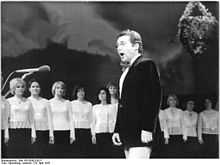Peter Schreier

Peter Schreier (born 29 July 1935) is a German tenor and conductor.
Early life
Schreier was born in Meissen, Saxony, East Germany, and spent his first years in the small village of Gauernitz, near Meissen, where his father was a teacher, cantor and organist. In June 1945, when Schreier was almost ten years old, and just a few months after the destruction of Dresden, he entered the boarding school of the famous Dresden boys' choir, the Dresdner Kreuzchor (Choir of the Kreuzkirche or Church of the Cross). The choir had just been re-established. The young Peter and the few other choir members and teachers lived in a cellar in the outskirts of Dresden.
The conductor of the Kreuzchor, Rudolf Mauersberger, soon recognized Peter Schreier's great talent. He let him sing many solo alto parts and also created compositions that perfectly fitted Peter's boy voice. Solo recordings of Peter Schreier were made at the time (1948-1951) and are obtainable on compact disc even today.
Schreier was 16 years old when his voice broke, and he became a tenor, as he had passionately wished, because of the several Evangelists - all tenors - in J.S. Bach's Passions and in his Christmas Oratorio. After he had decided to become a professional singer he took lessons, at first privately, then later on at the Dresden Academy of Music. He had enough time to also study choral and orchestral conducting.
Musical career
Peter Schreier made his professional debut in August 1959, playing the role of the First Prisoner in Fidelio by Beethoven. In the years that followed he was successful as Belmonte in Die Entführung aus dem Serail (Abduction from the Seraglio) and somewhat later as Tamino in Die Zauberflöte (The Magic Flute), both operas by Mozart.
In 1963, he was employed by the Berlin State Opera at Unter den Linden. Starting in 1966, he was for many years an annual guest of the Vienna State Opera. That same year he made his debut in Bayreuth as the young seaman in Tristan und Isolde with Karl Böhm as conductor. For 25 years, beginning in 1967, he took part in the program of the annual Salzburg Festival. In 1969, he starred as The Witch in Engelbert Humperdinck's Hansel und Gretel, in a CD recording that featured the Staatskapelle Dresden.
He also sang Loge in Das Rheingold & Mime in Siegfried by Wagner. It was important to him to sing the title role of Palestrina, the opera by Hans Pfitzner, not only in Munich but also in East Berlin — a controversial issue at the time in East Germany.
He recorded Bach cantatas with Adele Stolte, Annelies Burmeister, Theo Adam, the Thomanerchor and the Leipzig Gewandhaus Orchestra conducted by Erhard Mauersberger, such as the cantata for Pentecost Erschallet, ihr Lieder, erklinget, ihr Saiten! BWV 172 in 1970.[1] Recordings of the Bach's St Matthew Passion have included the version conducted by both Rudolf and Eduard Mauersberger, Karl Richter, Claudio Abbado and Herbert von Karajan. He recorded Bach's St John Passion with Helmuth Rilling.
In June 2000, Schreier left the opera stage. His last role was Prince Tamino in Die Zauberflöte; he argued that he could no longer act as if he were still a young prince. He ended his singing career on December 22, 2005, combining the roles of evangelist and conductor in a performance of Bach's Christmas Oratorio in Prague.
Throughout his career Schreier has been famous as a singer of German Lieder, including the songs of Schubert and Schumann.
Since 1970, Schreier has also been a conductor with a special interest in the works of Mozart, J.S. Bach, and Haydn. During his singing career, in the performances of Bach's Oratorios, he would often combine the roles of Evangelist and conductor.
Peter Schreier is married and has lived in Dresden since 1945, in the district of Loschwitz on the right bank of the river Elbe.
Evaluation
Particularly in his later years, Schreier would not be considered to have the most beautiful of tenor voices. Rather, it is the intelligence of his musical expression, as well as the intensity which he projects into the meaning of the text, that have secured his reputation.
For example, the Penguin Guide to Compact Discs says of Schreier's recording of Franz Schubert's Schwanengesang, "Schreier's voice may no longer be beautiful under pressure, but ... the range of tone and the intensity of inflexion over word-meaning makes this one of the most compelling recordings ever." Of his recording of Schubert's Winterreise, the same authors say "this is an intensely involving reading, with changes of mood vividly conveyed, positive, electrifying."
Honours and awards
- Sonning Award (1988; Denmark)
- National First Class Prize of the GDR
- Bundesverdienstkreuz (Order of Federal Republic of Germany)
- Ernst von Siemens Music Prize 1988
- Honorary membership of the Musikverein Wien (Vienna Society of Music)
- Wiener Flötenuhr
- "Georg Philipp Telemann" Prize
- European Church Music Prize
- Title of Kammersänger (a title conferred to singers of outstanding merit) by the governments of the GDR, Bavaria and Austria
- Honorary citizen of the town of Meissen because of his efforts in fund-raising for the restoration of the town.
- He was awarded the Royal Academy of Music/Kohn Foundation Bach Prize in 2009.[2]
References
- ↑ Johann-Sebastian-Bach Adele Stolte, Annelies Burmeister, Peter Schreier, Theo Adam, Thomanerchor Leipzig, Gewandhausorchester Leipzig, Erhard Mauersberger - Erschallet, Ihr Lieder Kantate BWV 172 / Jesu, Der Du Meine Seele Kantate BWV 78, on discogs
- ↑ "Royal Academy of Music / Kohn Foundation Bach Prize is awarded to John Butt". Retrieved 2010.
Sources
- The quotation from the Penguin Guide to Compact Discs, by Ivan March, Edward Greenfield, and Robert Layton, is from the 1996 edition, published by Penguin, ISBN 0-14-051367-1.
External links
- Peter Schreier at AllMusic
- Peter Schreier biography on bach-cantatas
- documentary film on DVD about the last year of Peter Schreier as a singer
- Peter Schreier Page the fanpage about Peter Schreier
|